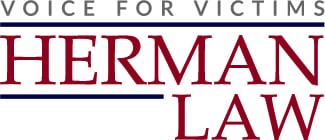NORTH CAROLINA SEXUAL ABUSE LAWYERS
Herman Law sex abuse lawyers know that these types of cases can be devastating to get through. Not only are victims processing mental, emotional, and physical trauma, but they are also trying to cope amid a complex legal process. Do not go through this process alone. Herman Law sex abuse lawyers child abuse victims fight for justice in North Carolina – and we want to help you too.
While every situation is different, if you or a loved one has been a victim of sexual abuse at the hands of a North Carolina individual or institution, please do not hesitate. Contact Herman Law today. You may be able to file a civil lawsuit and receive financial compensation for the emotional harm your abuser caused. While no amount of money can make up for what happened to you, taking legal action can be a crucial part of your healing process and receiving justice. Our law firm can answer all of your questions, listen to your story, and provide you with the legal representation you need to pursue a claim.
OUR EXPERIENCE REPRESENTING SEX ABUSE VICTIMS IN NORTH CAROLINA
WHAT IS SEXUAL ABUSE IN NORTH CAROLINA?
SEX ABUSE CASES IN NORTH CAROLINA
SEX ABUSE SETTLEMENTS IN NORTH CAROLINA
PENALTIES FOR SEX ABUSERS IN NORTH CAROLINA
WHAT IF SOMEONE SEXUALLY ABUSED ME IN AN INSTITUTION IN NORTH CAROLINA?
WHAT KIND OF COMPENSATION CAN I RECEIVE IF SOMEONE SEXUALLY ABUSED ME IN NORTH CAROLINA?
WHEN DO I HAVE TO FILE A LAWSUIT OR CIVIL CLAIM FOR A SEX ABUSE CASE IN NORTH CAROLINA?
SHOULD I HIRE AN EXPERIENCED NORTH CAROLINA SEX ABUSE ATTORNEY FOR MY CLAIM?
OUR EXPERIENCE REPRESENTING SEX
ABUSE VICTIMS IN NORTH CAROLINA
Herman Law sexual abuse attorneys have years of experience representing victims of sexual abuse in North Carolina sex crime cases. As recently as 2020, Herman Law brought two sexual abuse cases against the Catholic Diocese of Charlotte. The victims have gone unnamed.
The victims previously brought the cases against the diocese in 2011 and 2012, when they were both dismissed by 2014. The diocese asserted that “too much time had elapsed since the alleged incidents.” In 2019, the North Carolina legislature created the Child Victims Act (CVA), which allowed the cases to be brought back against the church. This North Carolina law created a two-year look-back window so that victims of any age can come forward to file a child sex abuse lawsuit, no matter how long ago the sexual abuse happened. This legislation is crucial to help victims seek justice -as many victims either do not come forward until later in life or suppress the memories of the abuse and do not remember the abuse until later in life. In many instances, before the CVA, once victims finally came forward, they could not seek justice because the statute of limitations had expired. In December 2021, the portion of the CVA that temporarily lifted the statute of limitations was deemed unconstitutional.
According to the lawsuits, the abusers include former priest Richard Farwell and ministry worker Joseph Kelleher. Alleged abuses include the molestation of a minor for three years in one case and one year in the other. The age of Kelleher’s victim at the time of abuse was just fourteen. Kelleher has since passed, but Farwell—transferred after the allegations to conceal his abuse—continued to molest his victim even after transfer and the boy’s move into an orphanage.
WHAT IS SEXUAL ABUSE IN NORTH
CAROLINA?
First-degree rape
First-degree rape, according to North Carolina General Statute 14-27, occurs when an individual engages in vaginal intercourse with another individual of the following dispositions
- “With a victim who is a child under the age of 13 years and the defendant is at least 12 years old and is at least four years older than the victim; or
- With another person by force and against the will of the other person, and:
- Employs or displays a dangerous or deadly weapon or an article which the other person reasonably believes to be a dangerous or deadly weapon; or
- Inflicts serious personal injury upon the victim or another person; or
- The person commits the offense aided and abetted by one or more other persons.”
Second-degree rape
Second-degree rape occurs when an individual engages in vaginal intercourse with a mentally incapacitated individual or by force against the other’s will.
First-degree sexual offense
A first-degree sexual offense occurs under the same circumstances as first-degree rape, without vaginal intercourse (the law also includes any other sexual acts).
Second-degree sexual offense
Sexual battery
Sexual battery occurs if an individual, for sexual arousal, sexual gratification, or sexual abuse, engages in sexual contact with another person under the same conditions as second-degree rape and second-degree sexual offense.
SEX ABUSE CASES IN NORTH CAROLINA
North Carolina news publication, StarNews Online, reported that thirteen victims sued the school district that employed former teacher Michael Kelly. The victims allege that Kelly sexually abused these thirteen victims over twenty years. StarNews reported that the plaintiffs also amended their complaint to include an additional allegation that the school board violated the victims’ “fundamental right to a sound basic education,” which the state’s constitution provides for all students.
However, the central part of the complaint is that, as a direct result of the sexual abuse at the hands of Kelly, the men suffered emotionally, psychologically, and mentally. Some men did not finish their educations, some dropped out of school, and some are struggling to make ends meet to this day. The lawsuit further claims that the school district failed to protect these victims and continues to fail to help these victims seek justice.
In July of this year (2021), a former Western Carolina University student sued a former University Catholic ministry leader and the Catholic Diocese of Charlotte. The Charlotte Observer reported that the student named Al Behm as the man who sexually abused him while he was at WCU in Cullowhee. The student claims that he knew Behm since he was a child in Connecticut as Behm was an ordained Catholic clergy member at the Ohio-based Glenmary Home Missioners religious order. The victim filed the lawsuit in Mecklenburg County Civil Superior Court, alleging that from approximately 1980 to 1984, Behm repeatedly sexually assaulted him when he would visit WCU as WCU’s first full-time Catholic campus minister. The victim states that the assaults caused such “severe emotional distress” that the student “was unable to graduate from college and experienced a significant delay in entering the workforce” full-time.
The diocese publicly admitted that child sexual abuse claims against Behm were credible. These claims were brought from the former student at WCU and Behm’s previous assignment in Kentucky. After WCU, others also brought credible claims against him in Tennessee.
Also, in July of this year, USA Today reported on North Carolina gym owner Nicholas Sweeney—whose victims accused him of taking inappropriate photos and making inappropriate comments toward his cheer athletes.
The USASF suspended Sweeney in January while the law enforcement investigation looked into his conduct with athletes. The investigation found that he took lewd photos of the athlete and told one cheerleader to take off her underwear when changing into her uniform. The USASF told parents that Sweeney is now prohibited from coaching athletes in the program.
However, more than a dozen times, parents emailed USASF and its investigator voicing concerns about Sweeney’s continued presence in the gym, sharing photos and videos as evidence. Sweeney denied any wrongdoing, and law enforcement closed its investigation without charges, saying no one had disclosed a crime. But Sweeney remained under USASF suspension.
In early August 2021, the USASF permanently banned Sweeney from the sport. Before being banned, he told USA TODAY that he was abiding by the terms of his suspension while continuing to be in the gym. “I stopped coaching all my teams. I stopped coaching classes. I have not done anything in the gym with any USASF athletes,” said Sweeney, adding that he has been coaching high school cheer teams in the gym. He did not respond to a request for additional comment about being banned by USASF. As of early August, his co-owner Darlene McNabb said Sweeney was in the process of selling his shares of the company to her in light of his permanent ban. She said he is no longer allowed in the gym under any circumstances.
The incident is one of many that point to failures to protect athletes across the national cheer community.
Also, in July, a previously registered sex offender was charged with six counts of child sex crimes, including posting material featuring child sex abuse on the internet. The legal charge was “second-degree sexual exploitation of a minor.”
SEX ABUSE SETTLEMENTS IN NORTH
CAROLINA
In 2010, the Roman Catholic Diocese of Charlotte awarded over one million dollars to a 23-year-old victim of sex abuse by a member of the Diocese of Charlotte. The diocese paid out the settlement for the man, who endured abuse from ages fourteen to fifteen. Bishop Accountability reported that the victim filed the lawsuit specifically against Father Robert Yurgel, the Roman Catholic Diocese of Charlotte, and the Order that Yurgel belonged to. The defendants in the case filed a motion to dismiss the lawsuit, stating that the statute of limitations barred the plaintiff. However, both parties proceeded through extensive discovery, including completing 25 depositions and producing over 40,000 pages of documents. The diocese finally agreed to the $1 million settlement plus five years of therapy and related medications payments.
PENALTIES FOR SEX ABUSERS IN NORTH CAROLINA
Penalties for sex abusers in North Carolina depend on the degree and category of abuse.
The penalty for first/second-degree rape and first/second-degree sexual offense is based on prior criminal history. It may range from 144 months in prison to life without parole. If it is against a child by an adult, the sentences range from 300 months in prison to life without parole.
The penalty for sexual battery also depends on prior criminal history. However, the sentence for the crime of sexual battery typically ranges from 1 to 150 days in prison and a fine at a court’s discretion.

WHAT IF SOMEONE SEXUALLY ABUSED
ME IN AN INSTITUTION IN NORTH
CAROLINA?
If someone sexually abused you in an institution in North Carolina, you may hold the institution liable for the abuse, as well as the individual or individuals directly responsible.
Institutions that have paid out sexual abuse settlements in the past have included, but are not limited to, the Catholic Church, the Boy Scouts, and various colleges and universities.

WHAT KIND OF COMPENSATION CAN I RECEIVE IF SOMEONE SEXUALLY ABUSED ME IN NORTH CAROLINA?

WHEN DO I HAVE TO FILE A LAWSUIT OR CIVIL CLAIM FOR A SEX ABUSE CASE IN NORTH CAROLINA?
Generally, one must file a civil claim for adult sexual assault in North Carolina within three years of the event. One must file a civil suit for child sexual assault in North Carolina within ten years of the victim’s eighteenth birthday. However, the SAFE Act—passed in 2019—granted a look-back period of two years in which anyone abused as a child may file a civil claim that previously expired. The deadline to file is December 31st, 2021.
SHOULD I HIRE AN EXPERIENCED NORTH
CAROLINA SEX ABUSE ATTORNEY FOR
MY CLAIM?
If someone sexually abused you in North Carolina, hire an experienced North Carolina sex abuse attorney to help guide you through the complexities of the legal system. We understand that this type of claim is sensitive and want to give you the respect and dignity you deserve while fighting for your compensation. If someone sexually abused you or a family member, you do not have to go through the process of understanding your legal rights alone. Sexual abuse victims should not hesitate – contact our legal team today for a free case evaluation here and obtain the legal advice and information you need to determine if you can take legal action.
